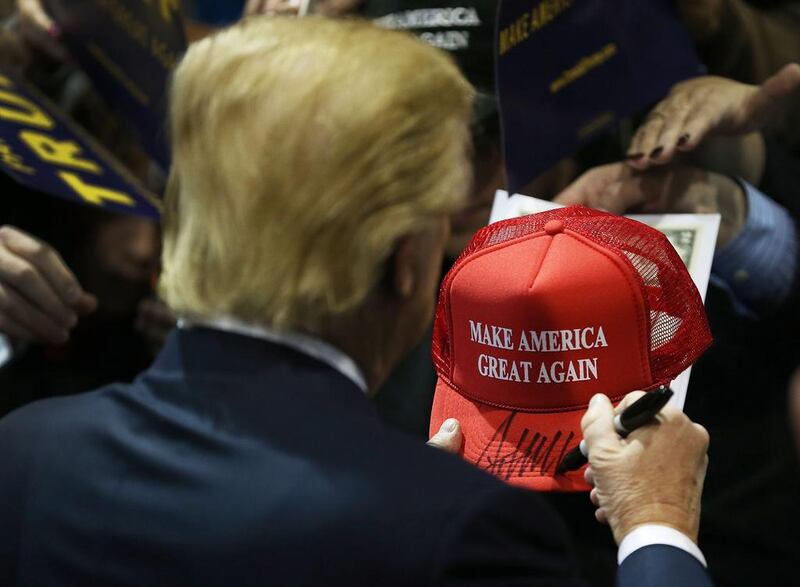Lin Xi is not having the best of days. Riding the subway in New York a few days ago, on her way home from taking her nine-year-old son to school, she was accosted by two younger women, who mocked her about wearing a red “Make America Great Again” hat, the signature campaign accessory of United States Republican presidential frontrunner Donald Trump.
“They said I was ignorant – I was stupid – for supporting Mr Trump,” said the 41-year-old Xi. “They said, ‘Trump hates you Chinese people!’ They are wrong.”
Xi said she ignored the women’s taunting and got off the train as soon as she could.
Hours later, Xi was waiting at the Trump Store inside Trump Tower, a commercial skyscraper owned by the businessman in Midtown Manhattan. Her intended purchase? Four more “Make America Great Again” hats, priced at US$25 (Dh92) a piece.
“One for my husband, one for his mother, one for my cousin and one for me — I want to have two,” said Xi.
Born and raised in China, Xi immigrated to the US in 2011 when her husband got a job as an engineer in New York. They live in Flushing, Queens, one of the city’s most ethnically diverse neighbourhoods, where many Asian, Hispanic and Arab immigrants reside.
When I asked her what she thought about Trump’s statements against China – Trump calls it America’s “No 1 abuser” when it comes to international trade, “robbing Americans of billions of dollars of capital and millions of jobs” — Xi looked at me pointedly.
“He is not wrong,” she said. “Everybody in China want the American dream. But they do it illegally.”
Xi says she supports Trump mostly for his pugnacious disposition: “We need a brave leader who will fight for us today.”
In the race for the Republican nomination, Trump is leading Ted Cruz by 739 delegates to 465, with 1,237 in total needed to win. Wisconsin is the next Republican primary and takes place on Tuesday.
Jose Nolasco was also at the Trump Store that afternoon. Like Xi, he was there to purchase a red hat that he plans to wear at a Trump rally on April 19, the day of the Republican primary in New York.
Nolasco, a 54-year-old Mexican-American who lives in the Washington Heights neighbourhood of Manhattan, admitted that his candidate is guilty of unjustified jibes. Infamously, Trump has implied that Mexicans are rapists and murderers.
“He’s not perfect. I know he’s also said bad things about women,” said Nolasco, a father of four girls. “But look at our other choices – they’re all the same useless establishment people. He’s the best option we have. Trump is a winner and he will win for us.”
Nolasco said he supports Trump’s plan to build a wall on the Mexican border.
“These illegal immigrants — they give us legal Mexicans a bad name,” he said.
Days prior, I met another Hispanic supporter of Trump at, of all places, a Marco Rubio rally in Miami, Florida. It was the night before the Florida primary and Rubio, a Cuban-American, was speaking at a basketball court a few blocks away from the home he grew up in. It would be Rubio’s final campaign event – he was crushed in his home state the next day by Trump and quit the race that same evening.
Diana Meneses, 37 years old and also a Cuban-American, grew up in the same neighbourhood and wanted to help give Rubio a warm homecoming.
“But tomorrow — and this is not personal — but I am voting for Donald Trump,” she said in a hushed tone, so the people around us wouldn’t hear. “He’s who we need right now. He will unite everyone, Republicans and Democrats, rich and poor, white and black and brown and all colours.”
Indeed, for most Trump supporters I met while covering presidential primaries in America’s East Coast states, Trump’s transgressions — particularly his aggressive slurs and lack of policy specifics — are trivial and pardonable.
Back at the Trump Tower, Fadi Charbel, a 52-year-old who lives in an Arab-American neighbourhood in Lower Manhattan, was also snapping up some campaign merchandise.
“I know that Trump is a bully. He is rude and he offends a lot of people. He is not the friendliest guy,” said Charbel, who immigrated to the US from Lebanon in the late-1980s. “But maybe that is the president we need to solve all our problems, somebody who is willing to offend to make things happen.”
“He will make the world great again,” Charbel added.
Not everyone inside the Trump Store that afternoon was a Trump admirer, however.
“These people are all crazy stupid,” said Jason Wicker, 23, a graphic designer from Harlem. “They’re so blinded by Donald’s celebrity – they’re unable to think straight. This ridiculous man as president? I would die.”
So why was Wicker in line for a Trump hat? He plans to wear it – but ironically. The trucker hat, with its old-school design, font and embroidery style, has been spotted on several young hipsters around New York.
“It’s so ‘80s, it’s so gaudy and big — this cap is so ugly, it’s almost beautiful,” he said.
Wicker was also buying a hat for his boss at work.
“I think we’re going to frame it and put it up on the office wall like a freaking artefact.”
James Gabrillo is a former arts editor at The National and is covering the US presidential elections for several publications in Asia and the Middle East.





